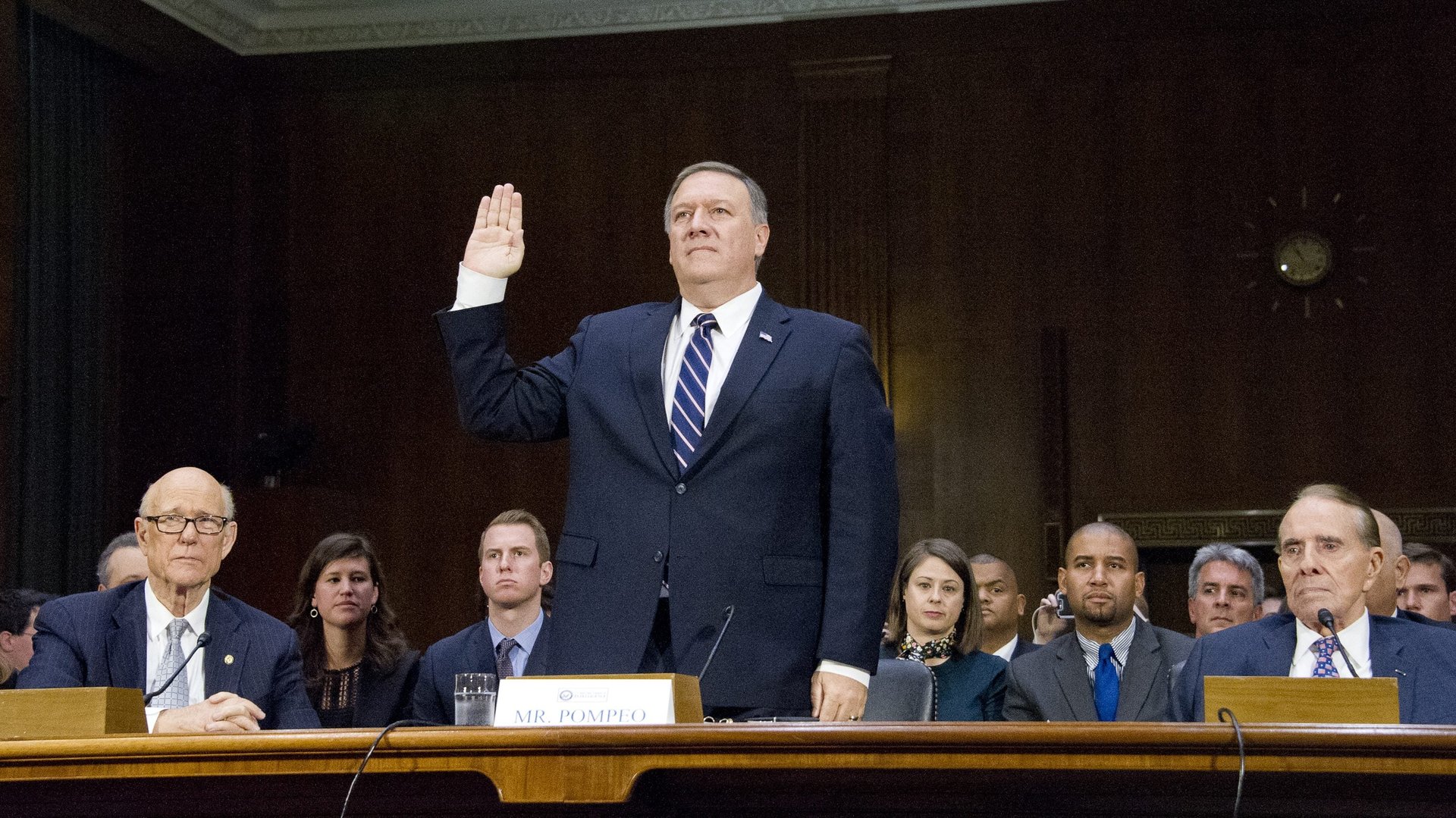The most interesting piece of the CIA director nomination hearing was the part we didn’t see
Almost as soon as it started, the Jan. 12 Senate confirmation hearing of Mike Pompeo was hit by a blackout. Not a news blackout—that would come later, in a closed-door hearing where US president-elect Donald Trump’s pick for CIA director presumably could speak more freely to the panel of senators questioning him.


Almost as soon as it started, the Jan. 12 Senate confirmation hearing of Mike Pompeo was hit by a blackout. Not a news blackout—that would come later, in a closed-door hearing where US president-elect Donald Trump’s pick for CIA director presumably could speak more freely to the panel of senators questioning him.
This was an honest-to-god electricity blackout. Inauspiciously, the power went just as the Senate Intelligence Committee’s ranking Democrat, senator Mark Warner of Virginia, mentioned Russian hacking as part of his opening remarks.
Unable to find out the source of the outage, the whole group moved to another hearing room, where committee chairman Richard Burr joked it was ”a conspiracy on the part of senator [Susan] Collins” to draw attention to the country’s critical infrastructure weaknesses. His gag about Russia’s possible role was less convincing: “We have ruled [it] out,” he laughed.
As for the actual questioning, well, all the juicy info on Russian hacking and we-know-not-what-else was left to the closed hearing going on in the afternoon. A couple of senators, like Tom Cotton of Arkansas, didn’t bother with any questions altogether during the public session.
A Tea Party darling, Kansas congressman Pompeo went into the hearing with a reputation as perhaps the most hardline, most political nominee for the Langley hot seat in history. He was the lead haranguer of Hillary Clinton over Benghazi (at one point saying the affair was “in some ways” worse than Watergate), defended the use of waterboarding, and backed the suggestion that Obama has conveyed “an affinity” for ISIL’s cause, if not its methods.
Today, he had a clear strategy for handling all of that, which was simply to punt on any questions about his strident past views. The job of the CIA director, he said repeatedly, is simply to execute the policy made by elected officials, and to make sure senators “have all the information you need” from America’s spies.
The Democratic senators didn’t bring up Benghazi, but tensions did start to show when Pompeo was hit with questions on sanctions, climate change, and WikiLeaks. Here are some highlights.
Pompeo potentially would defy Trump on torture
Pompeo said he would “absolutely not” go outside intelligence agencies’ legal remit on “enhanced interrogation” (i.e. waterboarding and other forms of torture) if ordered by Trump, when asked by California senator Dianne Feinstein if this were a possibility.
“I can’t imagine that I would be asked that by the president-elect,” he added, despite Trump’s campaign promise to bring back “much worse” than waterboarding.
No comment on where mass surveillance should be limited
Senator Ron Wyden of Oregon referenced a Pompeo op-ed from 2016, calling for the repeal of limits to mass-surveillance collections—which were stopped in the wake of Edward Snowden’s revelations. In the piece, Pompeo argued: “Congress should pass a law re-establishing collection of all metadata, and combining it with publicly available financial and lifestyle information into a comprehensive, searchable database.”
Asked what he thought the limits were to such a scheme, Pompeo tried to step back from his previous views. “There are of course boundaries to this,” he said. “First and foremost they begin with legal boundaries.”
When it was pointed out that Pompeo’s op-ed had called for those boundaries to change, Pompeo went on the attack, saying it would be “grossly negligent” to ignore publicly available “lifestyle” information.
“Congressman, I don’t take a backseat to anyone when it comes to protecting this country,” was Wyden’s testy response. He insisted Pompeo give a written response regarding those limits.
A broadside for Rex Tillerson on Russia
Unlike Trump and US secretary of state nominee Rex Tillerson, Pompeo is a famed Russia hawk. And senator Marco Rubio teased out a broadside from him on it.
In a heated exchange with Rubio at his own confirmation hearing on Jan. 11, Tillerson repeatedly refused to say that Russian president Vladimir Putin had committed war crimes in Syria. Pompeo, however, agreed with Rubio that Russia seemed to have targeted civilians, that doing so was a “violation of the laws of war,” and that it was “intensely unlikely” soldiers could have done so without Putin’s consent.
The line will no doubt have pleased his hardline colleagues in Congress, but opens up early divisions within the incoming administration.
The climate change question
A longtime climate skeptic and a major recipient of campaign donations from the climate-science-denying billionaire Koch brothers, Pompeo didn’t seem too fussed by the national security implications of climate change. When repeatedly asked by California senator Kamala Harris whether he acknowledges NASA’s conclusion that 97% of actively peer-reviewed academics believe in climate change, Pompeo attempted some clumsy dodges.
He “would prefer today not to get into the details of climate debate and science.” He hadn’t “spent enough time” to look at NASA’s findings. Finally, he promised that if confirmed he would review the findings and put aside political expedience to give a “straight up answer.”
On WikiLeaks and the alleged contact between Trump’s campaign and the Russians
Maine senator Angus King endearingly said that Pompeo had “sent out a Twitter” citing DNC emails released by WikiLeaks as “proof” that Hillary Clinton’s nomination was “fixed.” Pompeo said he couldn’t remember the tweet, insisting, “I have never believed that WikiLeaks was a credible source of information.” The tweet, for the record, is below.
After a lot of bluster, King also eventually cornered Pompeo into a promise that he would continue investigations into alleged contacts between the Trump campaign and the Kremlin.